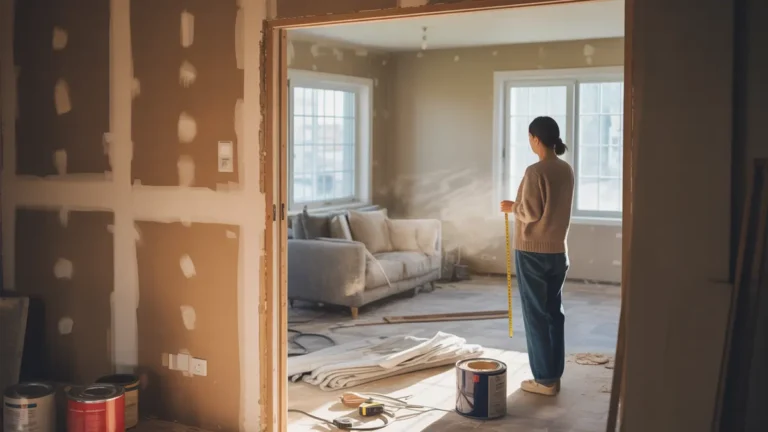Renovating your home can be exciting, but one small mistake can turn that excitement into stress and extra bills. From blowing your budget to forgetting to get permits, home renovation mishaps can pop up anywhere. If you take the time to plan right, ask smart questions, and work with the right people, you’ll protect your money and your time while making your dream space a reality.
10 Big Mistakes That You Should Avoid During Home Renovation
Before you start swinging hammers or tearing out walls, take a look at the common mistakes that cause most projects to go sideways. Watch out for these ten things, and you’ll have a much smoother time with your remodel.
- Not Reviewing Homeowners’ Insurance Coverage
- Hiring A Contractor Without Experience
- Having No Contracts Signed
- Ignoring Permits & Inspections
- Skipping The Preparation Phase
- Rushing The Whole Renovation Work
- Not Budgeting Properly
- Focusing on Finishing Over Structural Integrity
- Choosing Poor Quality Materials
- Ignoring The Impact On Resale Value
1. Not Reviewing Homeowners’ Insurance Coverage
A lot of people assume their homeowner’s insurance covers renovation accidents, but that’s not always the case. Before any work begins, give your insurance company a call. You need to know what’s covered and what’s not, especially for structural work or anything that changes your home’s footprint. If something goes wrong and you’re not covered, the bill could be huge. A quick check now can save you from a nasty surprise later.
2. Hiring A Contractor Without Experience
Going with the cheapest contractor you can find might seem smart at first, until they cut corners or don’t show up. Vertex Developers, Inc. brings over 50 years of combined experience to every job. Our team knows local codes, uses solid materials, and stays on schedule. Don’t gamble your house on someone inexperienced; hire people who know what they’re doing.
3. Having No Contracts Signed
It’s easy to shake hands and get started, but without something in writing, you’re asking for trouble. A real contract should lay out what’s being done, the materials being used, how much it costs, and when it’s all supposed to happen. Having it all spelled out helps avoid arguments and surprise charges later on. Don’t start anything until you’ve signed.
4. Ignoring Permits & Inspections
Some folks skip permits to save time or money, but that can backfire in a big way. You might get fined, or worse, have to demolish your finished work. Permits exist for a reason, and inspections help catch issues before they become major problems. Call your city’s building department and find out what’s needed before starting anything.
5. Skipping The Preparation Phase
Tearing things out without setting up the space first just leads to a mess, damage, or even injury. Move furniture, put down protective covers, and block off the area from the rest of the house. Good prep makes everything run smoother and protects your home from dust, dents, and delays.
6. Rushing The Whole Renovation Work
Everyone wants the job done fast, but rushing can lead to sloppy results. Materials like paint or concrete need time to cure. Pushing contractors to move too fast can cause expensive problems down the line. Give your timeline some breathing room for delays, deliveries, or weather. Better to do it right once than redo it later.
7. Not Budgeting Properly
Underestimating how much your project will cost is one of the most common mistakes. You’ll need to cover materials, labor, permits, and always add an extra 10–15% for the unexpected. Keep an eye on spending week by week and talk openly with your contractor about money. Staying realistic helps you avoid stress and running out of funds.
8. Focusing on Finishing Over Structure Integrity
It’s easy to get distracted by fancy tiles or light fixtures, but if your foundation is cracked or pipes are leaking, all the pretty finishes won’t matter. Fix the big stuff first — framing, drainage, insulation, and make sure the bones of your house are solid. Then add the cosmetic touches once you know everything underneath is right.
9. Choosing Poor Quality Materials
Grabbing whatever’s on sale can seem smart, but cheap materials wear out fast. Poor-quality flooring, plumbing parts, or fixtures often end up costing more in repairs or replacements. Ask your contractor what holds up best in your area, and consider spending more where it counts. It’s better to pay once than fix it twice.
10. Ignoring The Impact On Resale Value
You might love bold colors or custom layouts, but buyers down the road might not. Too much personalization can hurt your resale value. Try to keep big upgrades practical and appealing to most people. Features like energy-efficient windows or smart layouts tend to pay off later, even if you’re not planning to move anytime soon.
Opt for a Professional Remodeler Today!
The right home remodeler makes everything easier, from design to final inspection. Vertex Developers, Inc. has decades of experience helping homeowners across Los Angeles and Orange County. If you want quality work, clear communication, and less stress with your Los Angeles Home Remodeling, opt for an experienced pro like Vertex Developers, Inc.



